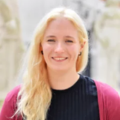
Targeting transcriptional deregulation in Acute Myeloid Leukaemia stem cells Dr Sophie Kellaway (Nottingham) presents her work on gene regulation using integrative genome-wide methods with a view to identifying novel therapeutic targets to improve treatment outcomes for blood cancers. Hosted by Dr Katherine Bridge.
Event details
Abstract
Abstract: In Acute Myeloid Leukaemia (AML), patients can harbour a population of quiescent leukemic stem cells (LSCs) which evade chemotherapy targeted towards proliferative blasts. The growth of LSCs can later be re-activated, triggering relapse. We recently showed that in t(8;21) AML, a leukaemia driven by the dominant negative transcription factor RUNX1::RUNX1T1, reactivation of LSC growth is caused by extrinsic signalling to misexpressed growth factor receptors. These lineage inappropriate signalling pathways (VEGF and IL-5) promote Activator Protein 1 (AP-1) dependent reorganisation of the chromatin landscape. Blocking either signalling pathway with repurposed monoclonal antibodies, or blocking AP-1 itself inhibits LSC growth and leukemogenesis in vitro and in vivo. Depletion of the oncogenic driver RUNX1::RUNX1T1 directly dampens the capacity for signalling activation and promotes differentiation of LSCs along epigenetically predetermined pathways. AP-1 has further roles beyond growth control, including differential regulation of DNA repair in the AML LSC/blast axis, which may offer an opportunity for synthetic lethality to block relapse completely. These mechanisms of LSC growth control are not limited to t(8;21) AML, as AP-1-dependent gene regulation and growth is a critical facet of all AML, regardless of driver mutation. We now know that subtype-specific signals activate AP-1 binding to chromatin and deciphering these is the current focus of the lab. Blockade of signalling-dependent activation of AP-1 in AML therefore offers an exciting new strategy to block LSC regrowth and prevent relapse in AML.
About the speaker

Professor Karl Hoffman
Dr Kellaway received her PhD from the University of Manchester in 2016, investigating stem cells from patients with Congenital Hyperinsulinism as a model system. Following this Sophie moved to University of Birmingham to work in the lab of Professor Constanze Bonifer, firstly utilising mouse embryonic stem cells to study the molecular roles of four different RUNX1-associated Acute Myeloid Leukaemia driver mutations including RUNX1-ETO, and subsequently dissecting the pathways which make RUNX1-ETO expressing stem cells grow. Sophie joined the University of Nottingham as Assistant Professor in Cancer Sciences in October 2023.